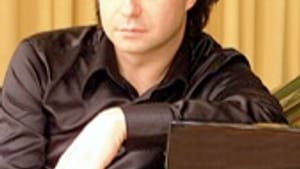Stay in the Loop
BSR publishes on a weekly schedule, with an email newsletter every Wednesday and Thursday morning. There’s no paywall, and subscribing is always free.
What it must have been like
DAN COREN
Within two hours on a recent fall Sunday, the Chamber Orchestra of Philadelphia and its conductor Ignat Solzhenitsyn delighted a wildly enthusiastic, nearly full house at the Perelman Theater by playing the Schubert Fifth Symphony, the Beethoven Piano Concerto No. 2 (with young Italian pianist Fabio Bidini making his local debut), and not one, but two Haydn Symphonies, Numbers 16 and 102.
It’s rare enough that you get to hear so much orchestral music from the heart of the classical repertory on a single concert. But this week, the Philadelphia Orchestra played yet more Haydn and Schubert, and plenty of Mozart too. I missed the Orchestra concert, but it would have been hard to match the Chamber Orchestra for beauty and stylistic fidelity.
Bidini sets the record straight
Glenn Gould, in his notes to the recording of the Beethoven Second Concerto he made with Leonard Bernstein early in his career, recognized the work as one of Beethoven’s most profound early accomplishments. I couldn’t agree more. On the whole, though, that concerto doesn’t get much respect. Even Beethoven, as I recall, dismissed it while praising his own first concerto. (The second is actually the earlier work.) It’s my nominee for Most Underrated Work in the Classical Repertory.
Fabio Bidini’s performance went a long way toward setting the record straight. In Beethoven’s own cadenza to the first movement, and even more so in the cadenza-like passage near the end of the slow movement– a movement that it’s hard to believe was composed before 1800— Bidini made me think, “Yes! This must have been what it was like to hear Beethoven himself improvise.”
Solzhenitsyn’s feel for Haydn
In Bernard Jacobson’s program notes, I was gratified to read his opinion that it’s “a radically mistaken view” to see Haydn as merely Beethoven’s naïve, bucolic predecessor. I’ve recently spent much time listening to Haydn’s Op. 76 String Quartets, written in the late 1790s, shortly before Beethoven was about to make his own great leap forward, and I’m more convinced than ever that Beethoven must have known them intimately and was still assimilating them into his own late quartets 25 years later.
Solzhenitsyn’s reading of the Haydn No. 102 was one of the most on-the-money performances I’ve heard— of anything. He understands the innovative and playful spirit of Haydn’s music as well as any conductor, and his orchestra responded with spectacular playing– especially the precisely articulated wind playing in the first movement.
Since Mozart is on my mind a lot these days, it struck me that all the works on this concert (except for the early Haydn symphony) were written after Mozart’s death in 1791. I couldn’t help thinking that, had Mozart never lived, this concert might have taken place anyway (although, to be sure, the thought of the loss of Mozart’s music is unbearable). It’s conceivable to me that Beethoven and Schubert could have written the music they did without having heard a note by Mozart. But their debt to Haydn is incalculable.
DAN COREN
Within two hours on a recent fall Sunday, the Chamber Orchestra of Philadelphia and its conductor Ignat Solzhenitsyn delighted a wildly enthusiastic, nearly full house at the Perelman Theater by playing the Schubert Fifth Symphony, the Beethoven Piano Concerto No. 2 (with young Italian pianist Fabio Bidini making his local debut), and not one, but two Haydn Symphonies, Numbers 16 and 102.
It’s rare enough that you get to hear so much orchestral music from the heart of the classical repertory on a single concert. But this week, the Philadelphia Orchestra played yet more Haydn and Schubert, and plenty of Mozart too. I missed the Orchestra concert, but it would have been hard to match the Chamber Orchestra for beauty and stylistic fidelity.
Bidini sets the record straight
Glenn Gould, in his notes to the recording of the Beethoven Second Concerto he made with Leonard Bernstein early in his career, recognized the work as one of Beethoven’s most profound early accomplishments. I couldn’t agree more. On the whole, though, that concerto doesn’t get much respect. Even Beethoven, as I recall, dismissed it while praising his own first concerto. (The second is actually the earlier work.) It’s my nominee for Most Underrated Work in the Classical Repertory.
Fabio Bidini’s performance went a long way toward setting the record straight. In Beethoven’s own cadenza to the first movement, and even more so in the cadenza-like passage near the end of the slow movement– a movement that it’s hard to believe was composed before 1800— Bidini made me think, “Yes! This must have been what it was like to hear Beethoven himself improvise.”
Solzhenitsyn’s feel for Haydn
In Bernard Jacobson’s program notes, I was gratified to read his opinion that it’s “a radically mistaken view” to see Haydn as merely Beethoven’s naïve, bucolic predecessor. I’ve recently spent much time listening to Haydn’s Op. 76 String Quartets, written in the late 1790s, shortly before Beethoven was about to make his own great leap forward, and I’m more convinced than ever that Beethoven must have known them intimately and was still assimilating them into his own late quartets 25 years later.
Solzhenitsyn’s reading of the Haydn No. 102 was one of the most on-the-money performances I’ve heard— of anything. He understands the innovative and playful spirit of Haydn’s music as well as any conductor, and his orchestra responded with spectacular playing– especially the precisely articulated wind playing in the first movement.
Since Mozart is on my mind a lot these days, it struck me that all the works on this concert (except for the early Haydn symphony) were written after Mozart’s death in 1791. I couldn’t help thinking that, had Mozart never lived, this concert might have taken place anyway (although, to be sure, the thought of the loss of Mozart’s music is unbearable). It’s conceivable to me that Beethoven and Schubert could have written the music they did without having heard a note by Mozart. But their debt to Haydn is incalculable.
Sign up for our newsletter
All of the week's new articles, all in one place. Sign up for the free weekly BSR newsletters, and don't miss a conversation.

 Dan Coren
Dan Coren
